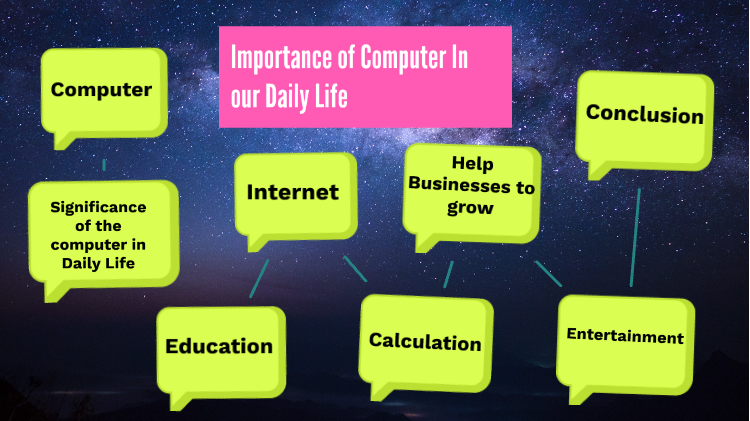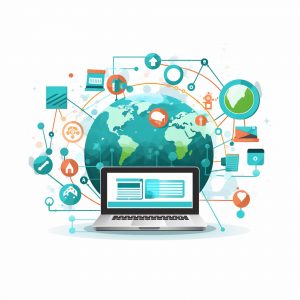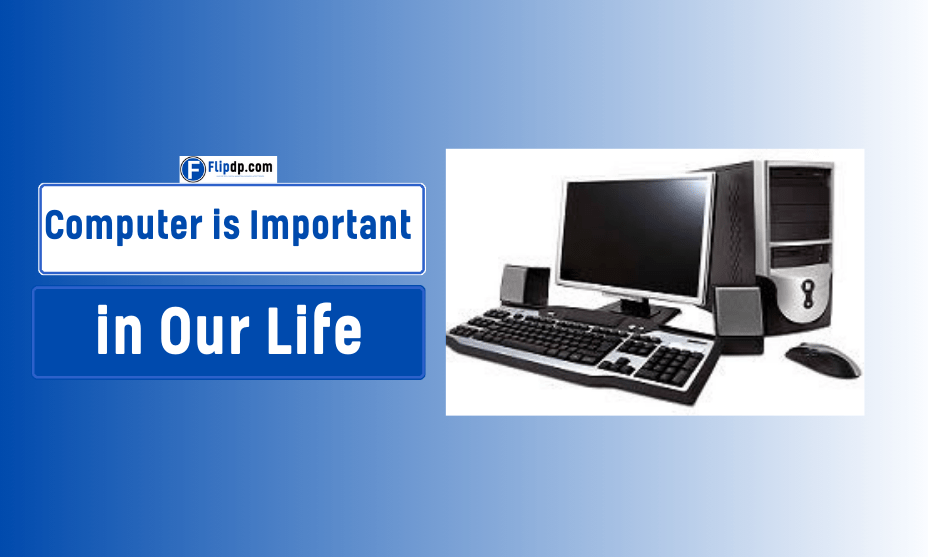In today’s rapidly evolving world, computers have become indispensable tools that permeate every aspect of our lives. From enhancing productivity in workplaces to transforming educational methodologies, the significance of computers cannot be overstated. This comprehensive guide delves into the multifaceted roles computers play, the benefits they offer, and their profound impact on modern society.
The Importance of Computers in Daily Life

Computers have seamlessly integrated into our daily routines, becoming essential for both personal and professional activities. Whether it’s managing finances, shopping online, or staying connected with loved ones through social media, computers facilitate a wide range of tasks with efficiency and ease. They serve as hubs for information, entertainment, and communication, making everyday activities more streamlined and accessible.
Everyday Computing
Everyday computing encompasses the routine use of computers for tasks such as browsing the internet, sending emails, and using applications like word processors and spreadsheets. Why Computer is Important in Our Life: A Comprehensive Guide These activities have become fundamental in maintaining personal organization, managing schedules, and performing daily chores more effectively. Additionally, smart devices like smartphones and tablets, which are essentially portable computers, extend the convenience and functionality of computing to virtually any location.
Benefits of Computer Technology in Modern Society

Computer technology has revolutionized various sectors, bringing about significant improvements and innovations. The benefits of computer technology extend beyond mere convenience, contributing to economic growth, enhanced healthcare, and improved quality of life.
Economic Growth and Business Efficiency
In the business realm, computers streamline operations, reduce costs, and increase productivity. Automation of tasks such as accounting, inventory management, and customer service allows businesses to operate more efficiently and respond swiftly to market changes. Moreover, computers enable data analysis and decision-making processes that drive strategic planning and competitive advantage.
Advancements in Healthcare
In healthcare, computers facilitate the management of patient records, support diagnostic processes, and enable telemedicine services. Advanced computer systems assist in medical research, leading to breakthroughs in treatments and technologies that save lives and improve patient care.
The Role of Computers in Enhancing Productivity

Computers are pivotal in boosting productivity across various domains. They automate repetitive tasks, allowing individuals and organizations to focus on more complex and creative endeavors. Software applications like project management tools, collaboration platforms, and productivity suites enhance workflow efficiency and facilitate seamless teamwork.
Automation and Efficiency
By automating routine tasks such as data entry, scheduling, and report generation, computers free up valuable time for employees to engage in strategic planning and innovative projects. This shift not only enhances individual productivity but also contributes to overall organizational efficiency and growth.
Remote Work and Flexibility
Computers enable remote work, offering flexibility and improving work-life balance. With the advent of cloud computing and virtual collaboration tools, employees can work from anywhere, ensuring continuity and productivity even in challenging circumstances.
Computers as Essential Tools for Education
The integration of computers in education has transformed traditional teaching and learning methods. Computers provide access to a vast array of educational resources, interactive learning tools, and online platforms that enhance the learning experience.
Digital Learning Platforms
Digital learning platforms offer courses, tutorials, and interactive content that cater to diverse learning styles and paces. These platforms facilitate self-paced learning, enabling students to grasp complex concepts more effectively.
Research and Information Access
Computers grant students and educators access to an extensive range of information and research materials. Online libraries, academic journals, and educational databases support in-depth research and knowledge acquisition, fostering a more comprehensive understanding of subjects.
Impact of Computers on Workplace Efficiency
In the workplace, computers are indispensable for maintaining operational efficiency and fostering innovation. They support various functions, from administrative tasks to creative processes, ensuring that businesses run smoothly and effectively.
Data Management and Analysis
Computers enable efficient data management, allowing organizations to store, organize, and analyze vast amounts of information. This capability is crucial for making informed decisions, identifying trends, and optimizing business strategies.
Enhanced Communication and Collaboration
Computers facilitate enhanced communication and collaboration through email, instant messaging, video conferencing, and collaborative software. These tools ensure that team members can work together seamlessly, regardless of their physical locations, thereby improving overall productivity and project outcomes.
How Computers Facilitate Communication
Communication has been revolutionized by computers, making it faster, more efficient, and more accessible. From instant messaging and email to video conferencing and social media, computers provide diverse platforms that connect people globally.
Instant Messaging and Email
Instant messaging and email have become fundamental communication tools in both personal and professional settings. They allow for quick and efficient exchanges of information, enabling real-time collaboration and decision-making.
Video Conferencing and Social Media
Video conferencing tools like Zoom and Microsoft Teams facilitate face-to-face meetings, enhancing communication clarity and fostering stronger relationships among team members. Social media platforms connect individuals and businesses, providing avenues for networking, marketing, and community building.
The Significance of Computer Literacy in the Digital Age
In the digital age, computer literacy is a crucial skill that empowers individuals to navigate and thrive in an increasingly technology-driven world. Being computer literate means possessing the ability to use computers effectively, understand software applications, and stay updated with technological advancements.
Educational and Professional Advantages
Computer literacy opens up numerous educational and professional opportunities. It is a fundamental requirement in many job sectors, enhancing employability and career advancement prospects. Additionally, it enables individuals to access online education, participate in digital communities, and engage in lifelong learning.
Personal Empowerment and Independence
On a personal level, computer literacy fosters independence by enabling individuals to manage personal finances, access government services, and stay informed about current events. It also enhances digital citizenship, promoting responsible and informed participation in the digital landscape.
Computers and Their Influence on Personal Finance Management
Computers play a crucial role in personal finance management, offering tools that help individuals manage their income, expenses, investments, and savings effectively. With the advent of financial software and online banking, managing finances has become more convenient and accessible than ever before.
Financial Software and Budgeting Tools
Budgeting tools like Microsoft Excel, Mint, and other financial software enable users to track their income and expenses with precision. These tools allow individuals to create budgets, monitor spending habits, and set financial goals, ultimately promoting better financial planning and decision-making.
Online Banking and Investment Management
Computers also facilitate online banking, making it possible to conduct transactions, pay bills, and monitor account activity from the comfort of home. Moreover, investment management platforms provide individuals with easy access to stock trading, investment portfolios, and retirement planning tools, empowering them to make informed financial decisions.
The Role of Computers in Advancing Healthcare
Computers have significantly impacted the healthcare sector, improving the quality of care, accessibility, and efficiency of medical services. From managing patient records to supporting advanced medical research, computers are essential tools for healthcare professionals.
Electronic Health Records (EHRs)
Electronic Health Records (EHRs) have revolutionized patient care by making medical history and treatment data more accessible to healthcare providers. This enables more accurate diagnoses, timely interventions, and personalized treatment plans, ultimately leading to better health outcomes.
Telemedicine and Remote Monitoring
Telemedicine has become a major advancement in healthcare, allowing patients to consult doctors from the comfort of their homes. Computers facilitate video consultations, remote monitoring of health conditions, and digital prescription management, making healthcare services more accessible to those in remote areas or with mobility challenges.
Computers in Research and Development
Computers are invaluable tools in research and development (R&D), driving innovation in fields such as medicine, engineering, and technology. They facilitate data analysis, simulations, and modeling, accelerating the research process and enhancing the quality of results.
Data Analysis and Simulations
Researchers use computers to analyze large datasets, identify patterns, and make data-driven decisions. In fields like pharmaceuticals and biotechnology, computers are used to simulate chemical reactions and predict the outcomes of experiments, thereby reducing the need for costly physical trials.
Collaboration and Knowledge Sharing
Computers enable collaboration among researchers across the globe through shared databases, cloud platforms, and virtual meetings. This connectivity fosters the sharing of ideas, resources, and findings, ultimately accelerating innovation and the development of new technologies.
The Relationship Between Computers and Social Interaction
Computers have redefined the way people interact and communicate. Social networking platforms and online communities enable individuals to connect with others, share experiences, and form relationships across geographical boundaries.
Social Media and Online Communities
Social media platforms such as Facebook, Twitter, and Instagram are powered by computers, allowing individuals to maintain social connections, share life events, and engage in discussions. Online communities, such as forums and interest groups, provide opportunities for like-minded individuals to come together and share knowledge.
Positive and Negative Impacts on Relationships
While computers enhance social connectivity, they can also impact relationships negatively. Excessive screen time can lead to social isolation, and online interactions may sometimes lack the depth of in-person communication. Balancing online and offline interactions is essential for maintaining healthy social relationships.
The Necessity of Computers for Remote Work
Remote work has become increasingly common, and computers are central to this shift. They allow employees to work from any location, access company resources, and collaborate effectively with team members, contributing to a more flexible and adaptive work environment.
Virtual Collaboration Tools
Tools such as Slack, Microsoft Teams, and Zoom are essential for communication and collaboration in remote work settings. Computers provide the hardware and software needed to facilitate video conferencing, file sharing, and real-time communication, ensuring that remote teams can work as efficiently as in-office teams.
Productivity and Work-Life Balance
Remote work supported by computers helps employees maintain a better work-life balance by reducing commuting time and allowing for more flexible schedules. This flexibility can improve job satisfaction and productivity, ultimately benefiting both employees and employers.
Importance of Computers in Data Analysis
Data analysis is a critical function in numerous fields, from business to healthcare, and computers are indispensable tools for processing and analyzing data. They enable organizations to derive insights from data, make informed decisions, and identify trends that drive strategic planning.
Big Data and Business Intelligence
Computers are essential for managing and analyzing big data, which involves large and complex datasets. Businesses use computers to generate business intelligence, optimize operations, and enhance customer experiences, giving them a competitive edge in the market.
Data Visualization and Decision Making
Data visualization tools, such as Tableau and Power BI, use computers to present data in an understandable format, aiding in decision-making processes. Visual representations like graphs, charts, and dashboards make it easier for stakeholders to interpret data and make informed decisions quickly.
How Computers Transform the Entertainment Industry
The entertainment industry has undergone a massive transformation with the advent of computers. They play a key role in content creation, distribution, and consumption, offering endless opportunities for entertainment through movies, music, games, and more.
Digital Media and Streaming Platforms
Streaming platforms like Netflix, Spotify, and YouTube rely on computers to deliver content to millions of users worldwide. Computers are used to encode, store, and stream digital media, allowing users to access their favorite movies, shows, and music on demand.
Gaming and Virtual Reality
Computers have revolutionized gaming, providing realistic graphics, immersive experiences, and online multiplayer capabilities. The development of virtual reality (VR) technology has further expanded the boundaries of entertainment, offering users an interactive and immersive experience.
The Evolution of Computer Technology in Education
Computer technology has significantly evolved in education, making learning more interactive and accessible. From the traditional classroom to virtual learning environments, computers have transformed how knowledge is imparted and acquired.
Online Learning and Virtual Classrooms
Online learning platforms, such as Coursera and Khan Academy, provide access to a wide range of courses and educational materials. Computers facilitate virtual classrooms, enabling students to learn from instructors anywhere in the world and participate in interactive lessons.
Digital Assessment and Feedback
Computers also facilitate digital assessments, allowing teachers to evaluate students’ progress in real-time and provide personalized feedback. This helps in identifying areas where students need additional support, ensuring a more targeted and effective learning experience.
The Impact of Computers on Business Operations
Computers are integral to business operations, streamlining processes, improving efficiency, and enabling better decision-making. They support various functions, including financial management, customer service, and logistics, making businesses more agile and competitive.
Customer Relationship Management (CRM)
CRM systems, powered by computers, help businesses manage interactions with current and potential customers. By analyzing customer data, companies can improve their services, enhance customer satisfaction, and build lasting relationships.
Supply Chain Management
In logistics, computers are used to manage supply chains, ensuring that products are manufactured, stored, and delivered efficiently. Real-time tracking and inventory management systems help businesses reduce costs, avoid delays, and meet customer demands.
The Significance of Cybersecurity in Computer Usage
As computers become more central to our lives, cybersecurity has become increasingly important. Protecting sensitive information from cyber threats, such as hacking and malware, is crucial for individuals and organizations alike.
Data Privacy and Protection
Cybersecurity measures, including encryption and firewalls, protect personal and financial data from unauthorized access. Individuals must be aware of safe practices, such as using strong passwords and avoiding suspicious links, to protect themselves online.
Organizational Security
Businesses also rely on cybersecurity to safeguard their data and systems. Regular security audits, employee training, and the implementation of cybersecurity policies help protect against breaches that could have severe consequences for both the company and its clients.
The Future of Computers in Everyday Life
The future of computers is promising, with advancements in artificial intelligence (AI), machine learning, and quantum computing poised to further revolutionize how we live and work. Computers will continue to evolve, offering new possibilities and reshaping society in unprecedented ways.
Artificial Intelligence and Machine Learning
AI and machine learning are making computers smarter, allowing them to learn from data, predict outcomes, and perform complex tasks. These technologies will play a significant role in sectors like healthcare, finance, and education, driving innovations that improve efficiency and quality of life.
Quantum Computing and Future Potential
Quantum computing represents the next frontier in computer technology, with the potential to solve problems that are currently beyond the capabilities of classical computers. This technology could revolutionize fields like cryptography, materials science, and artificial intelligence, opening new avenues for scientific research and technological advancement.
How Computers Enhance Learning Experiences
Computers have fundamentally transformed the educational landscape, offering innovative ways to enhance learning experiences for students of all ages. By integrating advanced technologies and interactive tools, computers make learning more engaging, accessible, and effective. This section explores the various ways computers enhance learning, from personalized education to interactive simulations.
Personalized Learning
One of the most significant advantages of computers in education is the ability to provide personalized learning experiences. Educational software and adaptive learning platforms use algorithms to tailor content to each student’s unique learning pace and style. This customization ensures that students receive the right level of challenge, helping them to grasp complex concepts more effectively and maintain their motivation.
Interactive Simulations and Virtual Labs
Computers enable the creation of interactive simulations and virtual labs, allowing students to experiment and explore subjects in a risk-free environment. In fields such as chemistry, physics, and biology, virtual labs offer hands-on experience without the need for expensive equipment or the risk of hazardous materials. These simulations enhance understanding by providing visual and practical representations of theoretical concepts.
Access to a Wealth of Resources
With computers, students have access to an unprecedented amount of information and educational resources. Online libraries, educational websites, and digital textbooks provide a vast array of materials that can supplement traditional classroom learning. Additionally, multimedia resources such as videos, podcasts, and interactive tutorials cater to different learning preferences, making education more inclusive and comprehensive.
Collaboration and Communication Tools
Computers facilitate collaboration among students and between students and teachers through various digital tools. Platforms like Google Classroom, Microsoft Teams, and Slack enable real-time communication, file sharing, and collaborative project management. These tools not only enhance teamwork skills but also prepare students for the collaborative nature of modern workplaces.
Enhanced Assessment and Feedback
Computers streamline the assessment process by allowing for automated grading and immediate feedback. Educational software can assess quizzes, assignments, and exams, providing instant results that help students identify areas for improvement. Teachers can also use data analytics to track student progress, tailor instruction to individual needs, and implement targeted interventions to support student success.
The Role of Computers in Global Connectivity
Computers are the backbone of global connectivity, enabling seamless communication and information exchange across the world. This connectivity has profound implications for personal relationships, business operations, and access to information. By bridging geographical gaps, computers foster a more interconnected and informed global community.
Internet and World Wide Web
The internet, powered by computers, is the primary medium through which global connectivity is achieved. The World Wide Web allows individuals to access information, connect with others, and engage in various online activities. From social networking sites to online marketplaces, the internet facilitates a wide range of interactions that transcend physical boundaries.
Social Networking and Communication Platforms
Social networking platforms like Facebook, Twitter, LinkedIn, and Instagram rely on computers to connect millions of users worldwide. These platforms enable individuals to share updates, photos, and videos, fostering personal connections and communities of interest. Additionally, communication tools such as email, instant messaging, and video conferencing enhance both personal and professional interactions, making it easier to stay in touch regardless of location.
Remote Collaboration and Global Teams
In the business world, computers enable remote collaboration, allowing companies to build global teams and operate across multiple time zones. Tools like Zoom, Microsoft Teams, and Slack facilitate virtual meetings, project management, and real-time collaboration, ensuring that teams can work together effectively despite geographical distances. This capability not only expands the talent pool but also enhances flexibility and responsiveness in business operations.
Benefits of Computers for Students and Educators
Computers offer numerous benefits for both students and educators, enhancing the educational process and creating a more dynamic and effective learning environment. These benefits extend beyond traditional teaching methods, fostering innovation, engagement, and efficiency in education.
Enhanced Teaching Methods
Educators can leverage computers to implement diverse teaching methods that cater to different learning styles. Interactive whiteboards, multimedia presentations, and educational software make lessons more engaging and facilitate the understanding of complex topics. Additionally, teachers can use online resources and digital tools to create more dynamic and interactive lesson plans.
Improved Student Engagement
Computers help increase student engagement by incorporating interactive and multimedia elements into the learning process. Gamified learning platforms, educational games, and interactive quizzes make learning more enjoyable and motivating for students. This increased engagement can lead to better retention of information and a more positive attitude towards education.
Streamlined Administrative Tasks
For educators, computers simplify administrative tasks such as grading, attendance tracking, and lesson planning. Educational software can automate these processes, freeing up time for teachers to focus more on instruction and student support. Additionally, digital record-keeping ensures that student information is organized, easily accessible, and secure.
Access to Professional Development
Computers provide educators with access to a wealth of professional development resources. Online courses, webinars, and educational forums allow teachers to continuously improve their skills and stay updated with the latest teaching methodologies and technologies. This ongoing professional growth enhances the quality of education that teachers can provide to their students.
The Influence of Computers on Creativity and Innovation
Computers are powerful tools that foster creativity and drive innovation across various fields. By providing access to advanced software, collaborative platforms, and vast information resources, computers enable individuals and organizations to develop new ideas, solve complex problems, and create innovative solutions.
Creative Software and Design Tools
Computers support creativity through a wide range of software and design tools that cater to different creative disciplines. Graphic design software like Adobe Photoshop and Illustrator, video editing tools like Adobe Premiere Pro, and music production software like Ableton Live empower artists, designers, and musicians to bring their creative visions to life. These tools offer advanced features that enhance the quality and efficiency of creative work.
Innovation in Research and Development
In research and development (R&D), computers accelerate innovation by enabling complex simulations, data analysis, and collaborative research. Scientists and engineers use computational models to test hypotheses, design experiments, and analyze results, leading to breakthroughs in various fields. The ability to process large datasets and run sophisticated simulations expedites the research process and fosters innovative solutions.
Collaborative Innovation Platforms
Computers facilitate collaborative innovation through platforms that allow individuals and teams to share ideas, collaborate on projects, and co-create solutions. Tools like GitHub for software development, Miro for brainstorming, and Trello for project management enable seamless collaboration, even among geographically dispersed teams. This collaborative environment enhances the collective creativity and accelerates the innovation process.
Importance of Digital Devices in Modern Life
Digital devices, which are essentially specialized computers, play a crucial role in modern life. From smartphones and tablets to smartwatches and IoT devices, these technologies enhance convenience, connectivity, and functionality in various aspects of daily living.
Smartphones and Tablets
Smartphones and tablets are ubiquitous digital devices that integrate multiple computing functions into portable forms. They enable instant communication, access to the internet, multimedia consumption, and the use of countless applications that cater to personal and professional needs. These devices have become essential tools for staying connected, managing tasks, and accessing information on the go.
Internet of Things (IoT) Devices
IoT devices, such as smart home appliances, wearable fitness trackers, and connected cars, leverage computer technology to enhance functionality and convenience. These devices collect and exchange data, allowing for automation and remote control of various aspects of daily life. For example, smart thermostats can optimize home heating and cooling, while wearable devices monitor health metrics and provide real-time feedback.
Enhancing Daily Activities
Digital devices streamline and enhance a wide range of daily activities, from shopping and banking to entertainment and fitness. Online shopping platforms, mobile banking apps, streaming services, and fitness apps all rely on computer technology to provide seamless and efficient user experiences. These devices make it easier to perform tasks, access services, and stay informed, contributing to a more connected and efficient lifestyle.
The Necessity of Computer Skills in the Workforce
In today’s technology-driven economy, computer skills are indispensable for success in the workforce. Proficiency in using computers and related technologies is a fundamental requirement across various industries, enhancing employability and career advancement opportunities.
Essential Computer Skills for Modern Jobs
Modern jobs demand a range of computer skills, from basic proficiency in using office software to advanced capabilities in programming, data analysis, and digital marketing. Skills such as word processing, spreadsheet management, and presentation design are essential for administrative and managerial roles. Additionally, specialized skills in areas like software development, graphic design, and cybersecurity are highly sought after in technical fields.
Career Advancement and Opportunities
Possessing strong computer skills opens up numerous career advancement opportunities. Employees who are proficient in using advanced technologies can take on more complex and higher-level roles, contributing to their professional growth and increasing their value to employers. Furthermore, computer skills facilitate continuous learning and adaptation, enabling individuals to keep pace with technological advancements and industry changes.
Bridging the Skills Gap
The necessity of computer skills in the workforce highlights the importance of bridging the skills gap through education and training. Educational institutions and employers must prioritize computer literacy and provide ongoing training programs to ensure that individuals are equipped with the necessary skills to thrive in the modern job market. Bridging this gap not only benefits individuals but also enhances the overall competitiveness and productivity of organizations.
The Role of Computers in Environmental Monitoring
Computers play a vital role in environmental monitoring, enabling the collection, analysis, and interpretation of data related to various environmental factors. This capability is essential for understanding and addressing environmental challenges, promoting sustainability, and protecting natural resources.
Data Collection and Analysis
Computers facilitate the collection and analysis of environmental data from diverse sources, including sensors, satellites, and research studies. Advanced data processing algorithms allow scientists to analyze large datasets, identify patterns, and monitor changes in environmental conditions. This information is crucial for assessing the health of ecosystems, tracking climate change, and predicting natural disasters.
Geographic Information Systems (GIS)
Geographic Information Systems (GIS) are powerful computer-based tools used for mapping and analyzing spatial data related to the environment. GIS technology enables the visualization of geographic information, facilitating the study of land use, biodiversity, water resources, and pollution levels. By integrating various data layers, GIS helps in making informed decisions for environmental management and conservation efforts.
Predictive Modeling and Simulation
Computers enable the creation of predictive models and simulations that forecast environmental changes and assess the potential impact of human activities. These models are used to simulate scenarios such as deforestation, urbanization, and climate change, providing valuable insights for policymakers and conservationists. Predictive modeling supports proactive measures to mitigate environmental degradation and promote sustainable practices.
The Integration of Computers in Everyday Tasks
Computers are seamlessly integrated into everyday tasks, enhancing efficiency, convenience, and productivity in various aspects of daily life. From managing household chores to organizing personal schedules, computers provide tools and applications that simplify and streamline routine activities.
Home Automation and Smart Living
Home automation systems, powered by computers, enable the control and automation of various household functions. Smart lighting, thermostats, security systems, and appliances can be managed remotely through computer interfaces, enhancing comfort, security, and energy efficiency. These systems allow homeowners to customize their living environments and optimize resource usage with ease.
Personal Organization and Time Management
Computers offer a range of applications that help individuals manage their personal organization and time effectively. Calendar apps, to-do lists, and project management tools enable users to schedule appointments, set reminders, and track tasks, ensuring that they stay organized and meet their deadlines. These tools enhance productivity and reduce the stress associated with managing multiple responsibilities.
Online Shopping and Digital Transactions
Computers facilitate online shopping and digital transactions, providing a convenient and secure way to purchase goods and services. E-commerce platforms allow consumers to browse products, compare prices, and make purchases from the comfort of their homes. Additionally, digital payment systems and online banking services streamline financial transactions, making them faster and more efficient.
Computers and Their Contribution to Society
Computers have made substantial contributions to society, driving progress, innovation, and improvement in various fields. Their influence extends beyond individual benefits, shaping the way communities function, economies grow, and cultures evolve.
Economic Development and Job Creation
Computers are key drivers of economic development, enabling the creation of new industries and job opportunities. The technology sector, fueled by advancements in computer technology, contributes significantly to GDP growth and employment. Additionally, computers enhance productivity across all sectors, leading to increased economic output and competitiveness.
Social Empowerment and Access to Information
Computers empower individuals by providing access to information, education, and opportunities for personal and professional growth. The internet serves as a vast repository of knowledge, enabling people to learn new skills, pursue higher education, and engage in lifelong learning. This access democratizes information and empowers individuals to make informed decisions and participate actively in society.
Cultural Exchange and Global Understanding
Computers facilitate cultural exchange and promote global understanding by connecting people from different backgrounds and regions. Through digital platforms, individuals can share their cultures, traditions, and perspectives, fostering mutual respect and appreciation. This interconnectedness contributes to a more inclusive and harmonious global community.
How Computers Support Collaboration and Teamwork
Collaboration and teamwork are essential components of success in both educational and professional settings. Computers provide the tools and platforms that enable effective collaboration, allowing individuals and teams to work together seamlessly, regardless of their physical locations.
Collaborative Software and Tools
Collaborative software and tools, such as Google Workspace, Microsoft Office 365, and Asana, enable teams to work together on projects in real-time. These platforms offer features like document sharing, version control, task assignments, and progress tracking, ensuring that team members stay aligned and productive. Collaborative tools enhance communication and streamline workflow, making teamwork more efficient and effective.
Virtual Meeting and Communication Platforms
Virtual meeting and communication platforms like Zoom, Microsoft Teams, and Slack facilitate real-time interactions among team members. These tools support video conferencing, instant messaging, and file sharing, enabling teams to discuss ideas, provide feedback, and make decisions collaboratively. Virtual meetings bridge the gap between remote and in-office teams, fostering a cohesive and unified work environment.
Project Management and Coordination
Computers support project management and coordination through specialized software that helps teams plan, execute, and monitor projects. Tools like Trello, Asana, and Monday.com allow teams to create project timelines, assign tasks, set deadlines, and track progress. These platforms ensure that projects are completed on time and within budget, enhancing overall team performance and accountability.
The Importance of Understanding Computer Security
As computers become more integral to our personal and professional lives, understanding computer security is paramount. Protecting digital information from threats such as cyberattacks, data breaches, and malware is essential for maintaining privacy, safeguarding sensitive data, and ensuring the smooth operation of digital systems.
Protecting Personal Information
Understanding computer security helps individuals protect their personal information from unauthorized access and misuse. Implementing strong passwords, using encryption, and being aware of phishing scams are fundamental practices that enhance personal security. Protecting personal data is crucial for preventing identity theft, financial loss, and privacy violations.
Safeguarding Organizational Data
For organizations, computer security is critical for safeguarding sensitive business information, including intellectual property, financial records, and customer data. Implementing comprehensive cybersecurity measures, such as firewalls, antivirus software, and secure networks, helps protect against data breaches and cyberattacks. Maintaining robust security protocols ensures the integrity and confidentiality of organizational data.
Cybersecurity Best Practices
Adopting cybersecurity best practices is essential for mitigating risks and enhancing computer security. These practices include regular software updates, employee training on security protocols, implementing multi-factor authentication, and conducting security audits. By staying informed about the latest security threats and adopting proactive measures, individuals and organizations can effectively protect their digital assets.
The Influence of Artificial Intelligence on Computer Usage
Artificial Intelligence (AI) is revolutionizing the way computers are used, enhancing their capabilities and expanding their applications across various domains. AI technologies enable computers to perform tasks that traditionally required human intelligence, such as decision-making, pattern recognition, and language processing.
Automation and Efficiency
AI-driven automation enhances efficiency by enabling computers to perform repetitive and time-consuming tasks with minimal human intervention. In industries such as manufacturing, AI-powered robots handle assembly line tasks, while in offices, AI tools manage scheduling, data entry, and customer service. Automation frees up human resources for more strategic and creative activities, boosting overall productivity.
Enhanced Decision-Making
AI algorithms analyze vast amounts of data to provide insights and support decision-making processes. In fields like finance, healthcare, and marketing, AI tools help identify trends, predict outcomes, and optimize strategies. By leveraging AI, organizations can make data-driven decisions that are more accurate and timely, leading to better outcomes and competitive advantages.
Natural Language Processing and Interaction
AI technologies, such as natural language processing (NLP), enable more intuitive and efficient interactions between humans and computers. Virtual assistants like Siri, Alexa, and Google Assistant use NLP to understand and respond to voice commands, making technology more accessible and user-friendly. AI-powered chatbots provide instant customer support, enhancing user experiences and satisfaction.
The Significance of Computers in Crisis Management
Computers play a crucial role in crisis management, providing the tools and capabilities necessary to respond effectively to emergencies and disasters. From real-time data analysis to communication coordination, computers enhance the efficiency and effectiveness of crisis response efforts.
Real-Time Data and Analytics
During a crisis, access to real-time data is essential for informed decision-making. Computers process and analyze data from various sources, such as sensors, social media, and news reports, to provide a comprehensive understanding of the situation. This information enables authorities to assess the impact, identify affected areas, and allocate resources effectively.
Communication and Coordination
Effective communication and coordination are vital during crisis management, and computers facilitate these processes through advanced communication platforms. Emergency responders use computers to coordinate efforts, share information, and manage resources in real-time. Communication tools like satellite phones, radio systems, and online platforms ensure that all stakeholders are connected and can collaborate efficiently.
Disaster Prediction and Prevention
Computers contribute to disaster prediction and prevention by enabling the development of predictive models and early warning systems. Advanced algorithms analyze historical data and current conditions to forecast potential disasters, such as hurricanes, earthquakes, and floods. These predictions allow for proactive measures, such as evacuations and resource mobilization, to mitigate the impact of disasters and save lives.
Conclusion
Computers are undeniably integral to modern life, influencing every facet of our personal and professional existence. From enhancing productivity and fostering innovation to facilitating global connectivity and supporting critical sectors like education and healthcare, the importance of computers cannot be overstated. As technology continues to evolve, the role of computers will only become more pivotal, driving progress and shaping the future of society. Embracing computer technology and developing computer literacy are essential for individuals and organizations to thrive in an increasingly digital world. By understanding and leveraging the myriad benefits that computers offer, we can harness their potential to create a more efficient, connected, and innovative society.
FAQs, Why Computer is Important in our life
Q1: Why are computers so important in our daily lives?
A: Computers play a crucial role in daily life because they streamline communication, improve productivity, enhance access to information, and provide entertainment. They are essential in education, healthcare, business, and almost every industry, making life more efficient and connected.
Q2: How do computers impact education?
A: Computers have revolutionized education by providing students with access to vast online resources, enabling distance learning, and facilitating interactive learning through educational software and tools. They also help educators organize lessons and manage student performance.
Q3: In what ways do computers help in the workplace?
A: Computers enhance workplace efficiency by automating tasks, managing data, improving communication, and facilitating collaboration through various software and tools. They are used in almost every industry for tasks ranging from data analysis to design and project management.
Q4: How do computers improve healthcare services?
A: Computers are essential in healthcare for patient data management, diagnostic imaging, telemedicine, and research. They help healthcare professionals make better-informed decisions, improve treatment plans, and enhance overall patient care.
Q5: Can computers help improve our personal lives?
A: Yes, computers improve personal lives by making it easier to communicate, manage finances, access entertainment, and stay informed. They also help with personal development through online courses and self-improvement tools.











